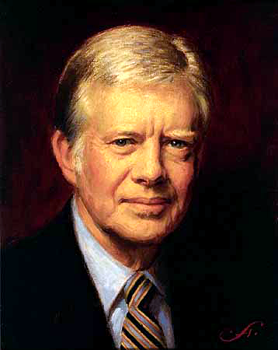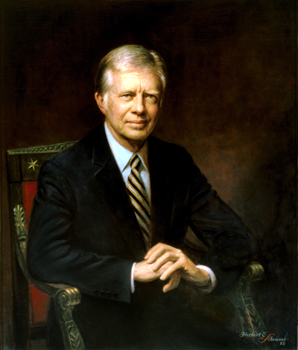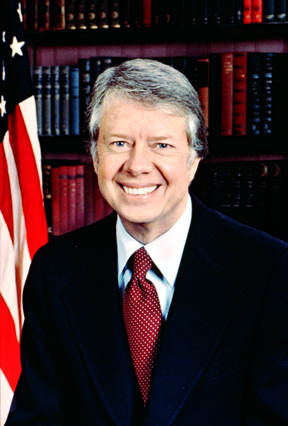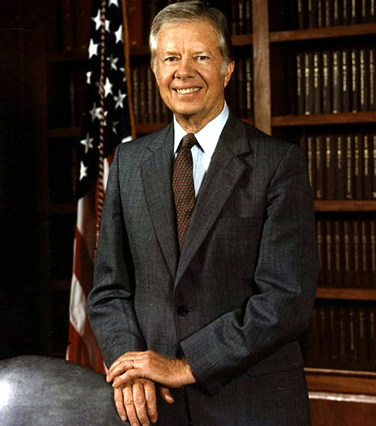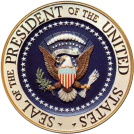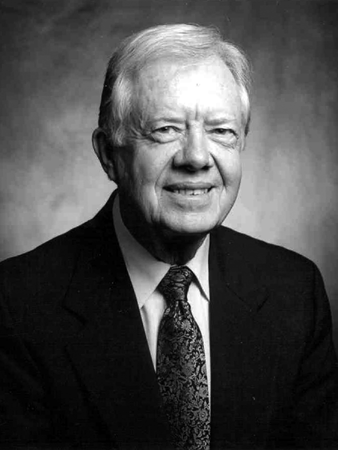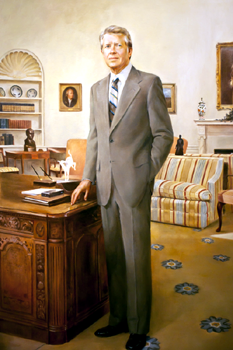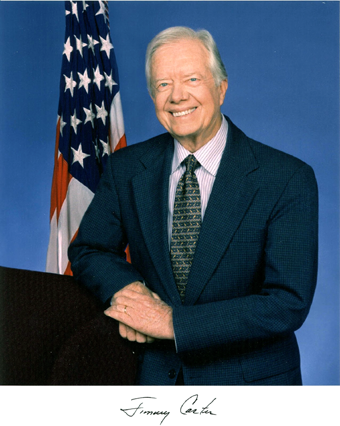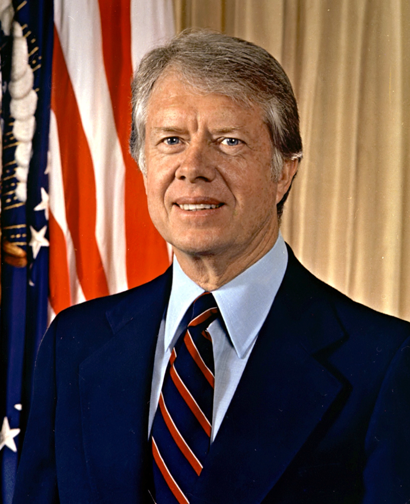|
JIMMY CARTER |
|
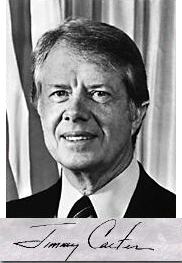
THE 39TH PRESIDENT OF
THE UNITED STATES OF AMERICA
(1977-1981)
CARTER, Jimmy
, full name James Earl Carter, Jr., (1924– ), 39th president of the U.S. (1977–81), the first from the Deep South since Andrew Jackson, and an outsider to traditional party politics.Carter was born in Plains, Ga., on Oct. 1, 1924. In 1927 his family moved to the tiny settlement of Archery, just outside Plains, where he lived until he was 17 years old. He graduated from high school in 1941, then spent a year at Georgia Southwestern College and another at Georgia Institute of Technology.
Early Career.
Carter began a military career in June 1943 by enrolling in the U.S. Naval Academy. By 1946 he was serving as a commissioned officer, and in that same year he married Rosalynn Smith (1927– ). In 1948 he entered submarine school, and in 1952 he was accepted into the navy’s prototype nuclear submarine training program. The next year his father died, and Carter resigned his commission to take over the family peanut business in Plains.
In Georgia Carter became a prominent businessman and active citizen, known as a liberal on racial matters. He was elected to the state senate in 1962, was reelected two years later, and then ran unsuccessfully for governor in 1966. At this time he had a religious experience, becoming a "born-again" Christian. He won the governorship in 1970 and headed a politically moderate administration, representative of the New South.
Before his gubernatorial term ended, Carter had decided to run for the presidency. After intense primary battles, he surmounted the liabilities of being unknown and from the Deep South and having no national constituency to become (1976) the Democratic nominee on the first ballot. Carter and his vice-presidential running mate, Senator Walter F. Mondale, defeated incumbent President Gerald R. Ford and his running mate, Senator Robert Dole, in the electoral college, 297-241. Carter won 40,800,000 popular votes to Ford’s 39,100,000.
Presidency.
Two of Carter’s most difficult challenges were to combat rising inflation, and to institute an energy program to decrease U.S. dependence on foreign oil. Inflation reached a high of 20 percent a year in 1980, but when the government raised interest rates in an attempt to bring it down, unemployment became a serious problem. The economy eventually became the thorniest issue of his reelection campaign. He did, however, secure passage of a comprehensive energy program that was supportive of private energy development.
In matters of defense, Carter advocated increased spending, favoring a cruise missile system. He endorsed a strong North Atlantic Treaty Organization but opposed its use of neutron bombs. He secured passage of a new Panama Canal Treaty (signed in 1977) and concluded a Strategic Arms Limitation Treaty (SALT II).
Carter initiated a foreign policy based on respect for human rights. Critics charged that he applied the policy unevenly, leading to a deterioration in relations with the Soviet Union. He retaliated for Soviet intervention in Afghanistan by instigating an international boycott of the 1980 Olympic Games in Moscow. His greatest triumph in this area came in 1978, when he provided the framework for the historic Egyptian-Israeli peace treaty that was signed in 1979. His greatest frustration was his inability to free the more than 50 U.S. hostages who had been taken by the revolutionary regime of Iran late in 1979.
Although Carter’s popularity declined sharply during his term, he successfully campaigned for renomination in 1980, fighting off a strong challenge from Senator Edward M. Kennedy. In the election, however, Carter and Mondale were overwhelmingly defeated by Republicans Ronald Reagan and George Bush.
Assassination attempt.
Raymond Lee Harvey was an Ohio-born unemployed American drifter. He was arrested by the Secret Service after being found carrying a starter pistol with blank rounds, ten minutes before President Jimmy Carter was to give a speech at the Civic Center Mall in Los Angeles on May 5, 1979.
Harvey had a history of mental illness, but police had to investigate his claim that he was part of a four-man operation to assassinate the president. According to Harvey, he fired seven blank rounds from the starter pistol on the hotel roof on the night of May 4, to test how much noise it would make. He claimed to have been with one of the plotters that night, whom he knew as "Julio." (This man was later identified as a 21-year-old illegal immigrant from Mexico, who gave the name Osvaldo Espinoza Ortiz.) At the time of his arrest, Harvey had eight spent rounds in his pocket, as well as 70 unspent blank rounds for the gun.
Harvey was jailed on a $50,000 bond, given his transient status, and Ortiz was alternately reported as being held on a $100,000 bond as a material witness or held on a $50,000 bond being charged with burglary from a car. Charges against the pair were ultimately dismissed for a lack of evidence.
Later Career.
After leaving office, Carter continued to champion human rights and became a public spokesman for several charitable causes. Frequently invited to mediate international conflicts, in 1994 he resolved a dispute between the U.S. and North Korea, and he led a U.S. team that arranged for President Jean-Bertrand Aristide (1953– ) to return to power in Haiti. Carter and his wife, Rosalynn, each received the U.S. Presidential Medal of Freedom in August 1999; in December he helped resolve a long-standing dispute between Uganda and Sudan and then represented the U.S. at ceremonies marking the handover of control of the Panama Canal to Panama. His writings include the nonfiction works Keeping Faith: Memoirs of a President (1982); The Blood of Abraham: Insights into the Middle East (1985); Turning Point: A Candidate, a State, and a Nation Come of Age (1993); An Hour Before Daylight: Memories of a Rural Boyhood (2001); and a book of poetry, Always a Reckoning: And Other Poems (1994).
The Carter Presidential Center, which includes the Office of Jimmy Carter, the Carter Center of Emory University, and the Jimmy Carter Library and Museum (1986), is in Atlanta.
Funeral and burial plans.
Carter intends to be buried in front of his home in Plains, Georgia. Both President Carter and his wife Rosalynn were born in Plains. Carter also noted that a funeral in Washington, D.C. with visitation at the Carter Center is being planned as well. In contrast, most presidents since Herbert Hoover have chosen burial at their presidential libraries or museums. Assassinated in office, John F. Kennedy was buried at Arlington National Cemetery. Lyndon B. Johnson chose to be buried at his ranch.
